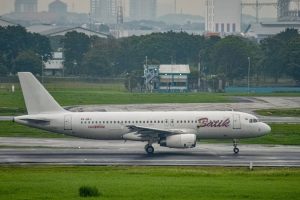Indonesia’s latest aviation “episode” would strike fear into the heart of even the most seasoned traveler.
On January 25, two Indonesian pilots on a Batik Air flight from Sulawesi to Jakarta reportedly fell asleep in the cockpit for 28 minutes while the plane was in manual mode, causing the flight to veer off course.
We are only hearing about the incident now following a report by the National Transportation Safety Committee, which has launched an inquiry into the events that led to what could have been a potentially fatal accident.
According to the report, while the plane left its intended flight path, none of the 153 passengers and four flight attendants were harmed and the plane landed in Jakarta, when the pilot woke up and realized the error.
The background to the story is that the pilot had given control of the Airbus A320 to the co-pilot, saying that he wanted to nap. Once in control of the plane, the co-pilot switched to manual mode to avoid bad weather, and then also fell asleep. In his defense, he claimed that he had not had enough rest as he had been helping his wife take care of their one-month-old twins.
Both pilots had tested negative for alcohol or drugs prior to the flight and had passed the requisite health checks that allowed them to fly.
The explanation of why the co-pilot fell asleep prompted the air transport director general, Maria Kristi Endah Murni, to say that they would “carry out an investigation and review of the night flight operation in Indonesia related with fatigue risk management for Batik Air and all flight operators.”
For its part, Batik Air has said that it “operates an adequate rest policy” although this presumably is only as effective as the pilots who follow it or not, as once they are officially off duty there is no way of knowing whether they are resting or not.
While thankfully the incident did not result in a mid-air collision or a crash landing, it could have been much worse. It would have contributed to Indonesia’s already shaky aviation safety record.
Just a few of the worst incidents include the following:
In 2005, a Mandala Airlines flight stalled shortly after take off from Polonia Airport in Medan in North Sumatra, crashing in a heavily populated area of the city and killing 149 people including all the passengers and crew on the flight and civilians on the ground.
In 2014, an AirAsia flight en route from Surabaya to Singapore crashed into the Java Sea killing all 155 passengers and seven crew aboard, while in 2018, Lion Air flight 610 also crashed into the Java Sea just 15 minutes after takeoff from Soekarno-Hatta International Airport in Jakarta, killing 189 people.
In 2021, a Sriwijaya Air flight also crashed after taking off from Soekarno-Hatta Airport, killing 62 passengers and crew.
There have been many more such fatalities, and there have also been many near misses over the years, including when a Lion Air flight carrying 108 people en route from Bandung to Denpasar dramatically crashed into the water close to Bali’s Ngurah Rai International Airport when the pilots failed to locate the runway. Fortunately, there were no casualties.
So bad is the country’s aviation safety record that the United States banned Indonesian carriers from flying in the country from 2007 to 2016 and the European Union enacted its own ban from 2007 until 2018.
According to the Aviation Safety Network, Indonesia has had 106 civilian airline accidents since 1945, claiming 2,305 lives.
So why is Indonesia such a magnet for aviation disasters?
The reasons are myriad, including the fact that the country operates a number of low-cost airlines that have poor safety records, but which crucially often fly to areas not serviced by other more reputable airlines, leaving many customers with limited options. The latter once led to the founder of low-cost carrier Lion Air, Rusdi Kirana, famously uttering the line, “My airline is the worst in the world, but you have no choice.”
To add to the country’s poorly maintained airlines, aviation infrastructure, including that at airports, often does not support or enforce safety regulations, and other issues include poor pilot training, which appears to have been one of the key issues related to the latest Batik Air incident.
While the investigation and any sanctions against the pilots or Batik Air are ongoing, it is difficult to say if the incident will prompt any real change in Indonesia’s already checkered aviation industry.
The fact that such incidents, and many more serious ones, continue to happen, would likely indicate that few lessons ever seem to be learned.

































